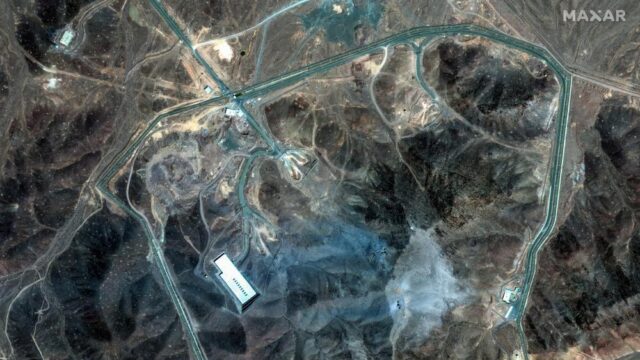This War Isn’t Over

Last night President Donald Trump announced a “Complete and Total CEASEFIRE” between Israel and Iran. Trump seemed exuberant. “This is the end of the war,” he told Axios’s Barak Ravid. “It is a great and wonderful thing for Israel and the world.” Asked how long the ceasefire would hold, Trump told NBC News, “I think the ceasefire is unlimited. It’s going to go forever.”
Forever is a long time, but the ceasefire, after a rough start, does seem to be taking hold as of 7 am New York time.
Also Monday, Washington and Tehran assured one another that their recent tit-for-tat exchange wouldn’t proceed to a second round. The U.S. had attacked three Iranian nuclear sites Saturday night, and Iran retaliated Monday with ballistic missile strikes targeting a U.S. military installation in Qatar. No Americans were harmed, and Trump seemed content to leave it there.
All this amounts to a welcome turn of events. But make no mistake: This war isn’t over.
I predicted in May that the U.S. would attack Iran, rather than strike a deal that limits its enrichment of uranium for nuclear fuel. While Trump seemed to genuinely want such a deal, I reasoned, Israel would go to great lengths to sabotage diplomacy.
“What I’m imagining is that Israel conducts strikes and then we get dragged into war in support of them,” I said on an episode of TAC Right Now. “They [Israel] can’t take out these underground nuclear reactors on their own; they need bunker busters for that, 30,000-pound bunker-busters that require B-2 Spirit stealth bombers.” The U.S., and not Israel, possesses those bunker-busters and B-2 Spirits, and I expected the U.S. to use them on Israel’s behalf.
This weekend, that prediction came to pass. Though America’s intervention now seems like a one-off, and though Israel and Iran have agreed to a ceasefire, the same dynamics that last month made me so pessimistic are still in play.
One reason a deal with Iran seems unworkable—and conflict unavoidable—is that the Trump administration has hardened its nuclear demands, insisting on a total ban, rather than limits, on Iran’s domestic enrichment of uranium. That’s a non-starter for Tehran, which says that it has a sovereign right under the Non-Proliferation Treaty to enrich uranium for peaceful purposes.
A failure to reach a nuclear deal with Iran needn’t be a casus belli, but Trump has said, repeatedly, that the alternative to an agreement is war. Since America’s act of war this weekend didn’t actually “obliterate” Iran’s nuclear program, as claimed, and since a deal doesn’t seem forthcoming, we can hardly rest assured that peace will last.
Another key dynamic is even more important: Israel sees Tehran as the final boss in its quest for regional hegemony, and its war effort the past couple weeks failed to defang Iran’s military entirely or decapitate its civilian leadership. Israel exerts profound influence in the U.S., including over the Trump administration, and it will look for opportunities to push Washington into war to finish off the Islamic Republic.
For now, Israel seems content to take a breather, if only to restock air-defense interceptors that can shoot down Iran’s ballistic missiles. But Israel’s deep hostility to Iran remains.
Consider how Israel’s most prominent supporters in America reacted last night to Trump’s announcement. “No such things as endless ceasefires,” said Mark Dubowitz of the Foundation for Defense of Democracies. “Only a permanent peace with Iran when the Islamic Republic is no more.” The Fox News host Mark Levin added more color: “I hate this word ‘ceasefire’… Adolf Hitler wasn’t thrown a lifeline.”
There’s one more reason, in addition to these preexisting dynamics, to expect a hot war to break out again: Tehran simply cannot trust the U.S. (or Israel) after events the past two weeks. Days before scheduled talks between Washington and Tehran, Trump seems to have greenlighted the surprise Israeli attack on Iran that kicked off the war earlier this month. Some reports even said that U.S. diplomacy with Iran had been a ruse, a deception campaign crafted to lull Tehran into a false sense of security.
As the Israel–Iran war escalated, Trump made a series of provocative moves that undoubtedly inflamed Tehran’s antipathy toward the U.S. The president threatened to kill Iran’s supreme leader; called on all residents of Tehran (more populous than New York City) to “immediately evacuate”; used the word “we” when describing Israeli military operations in Iran; and endorsed regime change in Iran.
Trump may genuinely still hope to strike an Iran nuclear deal. Tehran, for its part, agreed it would return to negotiations with Washington if Israel ceased fire. But going forward, Trump’s diplomatic overtures to Iran will meet extreme skepticism. As for Tehran’s view of Israel: The Islamic Republic will, for the foreseeable future, regard Israel as an urgent existential threat.
Every peace-loving American should welcome the ceasefire, but unless the underlying dynamics change, no one should assume that a stable equilibrium has been reached. Stay tuned.
